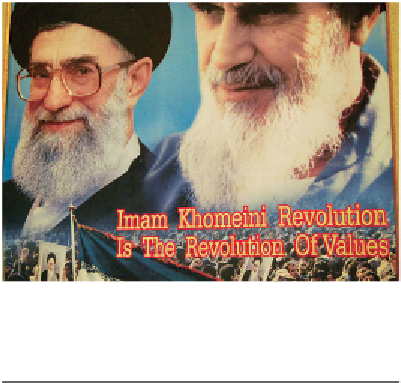Travel Reference
In-Depth Information
Seeing the Ayatol-
lah Khomeini from the
Iranian perspective was
jarring: Rather than
the impression I'd long
held—of a threatening,
unsmiling ideologue—
many Iranians consider
Khomeini a lovable sage...
unpretentious, approach-
able, and a defender of
traditional values. After
the Shah's excesses and
corruption, locals seemed
to overlook Khomeini's own brutal tactics. Khomeini's simplicity and holiness
had a strong appeal to the Iranian masses. Locals told me that Khomeini had
charisma, and if he walked into a room, even I, a non-Muslim, would feel it.
To the poor and the simple country folk, Khomeini was like a messiah. As
the personii cation of the Islamic Revolution, he symbolized deliverance from
the economic and cultural oppression of the Shah. Khomeini gave millions of
Iranians hope. Khomeini's successor, Ayatollah Ali Khamenei, has had much
less of an impact on the people. (I imagine Shia Muslims miss Khomeini like
Catholics miss John Paul II.)
Iranians who support the Revolution call it a “Revolution of Values.”
Many conservative Iranians I met told me they want to raise their children
without cheap sex, disrespectful clothing, drug abuse, and materialism—all
things they associate with America, and all things that, they believe, erode
character and threaten their traditional values. It worries them as parents.
It seemed to me that many of them willingly trade democracy and political
freedom for a society free of Western values (or, they'd say, “Western lack of
values”). It's more important to them to have a place to raise their children
that i ts their faith and their cherished notion of “family values.” One mother
told me, “We don't want our girls to become like Britney Spears.”
Of course, there's plenty of drug addiction, materialism, and casual
sex in Iran. But these vices are pretty well hidden from the determination
of the theocracy to root them out. In general, the Revolution seems to be
well-established. For example, in terms of commercialism, Iran and the US
For many Iranians, what they would call “family values”
trumps democracy and freedom. That's why they follow
a supreme leader: Khomeini (right) and his successor Ali
Khamenei (left).















































































